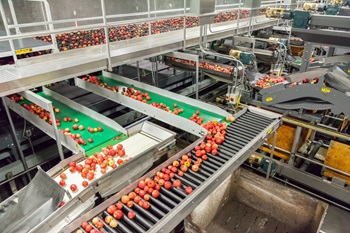<blockquote class="unquoted"><p>This is the third and final installment in a new FMI blog series on changes in taxes impacting the food industry. This series takes a deeper dive on individual tax provisions and what they mean for food companies.</p></blockquote><p style="text-align:center;"><em>The One Big Beautiful Bill Act included permanent changes to tax provisions that will help food companies stay competitive, including 100% bonus depreciation and a tax credit for research and development. </em></p><p>By Andy Harig, Vice President, Tax, Trade, Sustainability and Policy Development, FMI, and Erin McCarthy, Manager, Government Relations & Regulatory Affairs, FMI </p><img src="https://www.fmi.org/images/default-source/blog-images/apple-packing-facility.tmb-large-350-.jpg?Culture=en&sfvrsn=59e09793_1" style="margin-bottom:10px;float:right;margin-left:10px;" class="sf-immutable-selected -align-right" alt="Conveyor belts sorting apples" sf-size="100" /><p>Steve Jobs once famously said, “It isn’t the consumers’ job to know what they want.” For those of us raised on the idea “the consumer is always right” the knee-jerk response to Jobs’ sentiment may be to scoff and even recoil a bit. But there is a powerful insight contained within the quote – that it is the responsibility of companies to not just follow the lead of the public but to anticipate what they’re going to want and help them forge a trail to that destination before they even know it is where they want to be. In short, it is the responsibility of companies to innovate. </p><p>For the food industry, this innovation can take many different forms – whether it is developing innovative products to suit a new diet, upgrading software to improve the online grocery shopping experience, or investing in equipment to increase supply chain efficiency. </p><p>How do companies stay responsive in an environment of constantly evolving expectations? At the most basic level innovation is about investment. The “One, Big, Beautiful Bill” (OBBB) signed on July 4 contains changes to two separate provisions – 100% bonus depreciation and an enhanced research & development tax credit – that makes these investments easier by allowing companies to fully expense some of their expenditures the same year they are made. </p><p>The bill restores 100% bonus depreciation, permanently allowing for the full and immediate expensing for qualifying investments. Bonus depreciation was being phased out under previous tax law, meaning that companies could only deduct a fixed percentage of the original investment from their taxable income each year until the value of the investment reached zero. So, even though a company made and paid for the investment in one tax year, they could not fully write off the investment for many years down the line, decreasing the value of the deduction. Not only does full expensing promote growth and investment when it is most needed – it just makes sense. 100% bonus depreciation provided by the OBBB better reflects the actual costs a company incurs each year, instead of artificially spreading it out over several years.<span style="background-color:transparent;color:inherit;font-family:inherit;font-size:inherit;text-align:inherit;text-transform:inherit;word-spacing:normal;caret-color:auto;white-space:inherit;"> </span></p><p>Similarly, the OBBB also permanently allows companies to immediately deduct domestic research and experimental expenditures from their taxable income, reversing a requirement in the 2017 Tax Cuts and Jobs Act that these expenses must be amortized over a period of 5 years. Though there are limitations as to what qualifies, the R&D tax credit can be used for several relevant activities including improving existing packaging designs, increasing efficiency in the production process, or extending a product’s shelf life, to name a few. Qualified expenditures related to these activities are relatively broad and even include the wages of employees involved in research projects – promoting the creation of high value jobs.<span style="background-color:transparent;color:inherit;font-family:inherit;font-size:inherit;text-align:inherit;text-transform:inherit;word-spacing:normal;caret-color:auto;white-space:inherit;"> </span></p><p>Provisions like these allow industry to be nimble to adapt and grow their business, create jobs and make investments based on consumer needs, not an ever-changing tax code. While companies will always strive to keep up with consumer demand, changes brought by the OBBB will give companies the full tax benefits of their investments and help them take a well-earned bite of the carrot.</p>
[#item_full_content]



